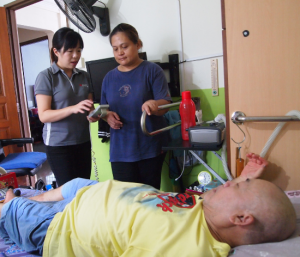Are you ready to unlock the true potential of caregiver training in Singapore? Dive into this article to discover the immense value that investing in quality care can bring. Explore how well-trained caregivers can make a profound impact on patient outcomes and learn about the key components of effective training programs. Join us as we delve into the importance of ongoing education and professional development in maintaining high standards of care. Get ready to unravel the secrets behind exceptional caregiving!

The Importance of Caregiver Training in Singapore
The importance of caregiver training in Singapore can’t be overstated. Caregivers play a vital role in the well-being and quality of life for individuals who require assistance with daily activities. With proper training, caregivers are equipped with the necessary skills and knowledge to provide effective care. Research has shown that trained caregivers have better communication skills, are able to handle emergencies more efficiently, and have a deeper understanding of the specific needs of their clients. Additionally, caregiver training programs focus on teaching important aspects such as medication management, infection control, and safety precautions. By investing in caregiver training, Singapore ensures that its elderly population receives high-quality care from competent professionals. This not only improves the overall standard of care but also enhances the dignity and independence of those receiving care.
The Impact of Quality Care on Patient Outcomes
Patient outcomes are directly influenced by the impact of providing high-quality care. When patients receive high-quality care, their health outcomes are generally better compared to those who do not. Research has consistently shown that quality care leads to improved patient satisfaction, reduced hospital readmissions, and decreased mortality rates.
One study conducted by a team of researchers at a leading medical institution found that hospitals with higher nurse staffing levels and better work environments had lower mortality rates among their patients. This suggests that investing in quality care, such as adequate staffing and supportive work environments, can have a positive impact on patient outcomes.
Additionally, evidence has shown that effective communication between healthcare providers and patients is crucial for achieving optimal patient outcomes. A study published in the Journal of Patient Safety found that poor communication contributed to adverse events in healthcare settings.
The Key Components of Effective Caregiver Training Programs
When it comes to effective caregiver training programs, you need to prioritize the development of essential skills and knowledge. These programs should focus on equipping caregivers with the necessary tools to provide high-quality care to their patients. Essential skills include communication, empathy, problem-solving, and critical thinking. Caregivers must also have a solid understanding of medical procedures and protocols.
Evidence-based research has shown that comprehensive caregiver training programs lead to improved patient outcomes and satisfaction. By investing in these programs, healthcare organizations can ensure that their caregivers are well-prepared to handle various situations and deliver quality care.
Furthermore, ongoing education and professional development play a crucial role in maintaining quality care standards. As new research emerges and medical practices evolve, caregivers must stay updated with the latest information and techniques. Continuous learning allows them to adapt quickly and provide the best possible care for their patients.
Transition: With an understanding of the key components of effective caregiver training programs established, let’s now explore the role of ongoing education and professional development in maintaining quality care standards.
The Role of Ongoing Education and Professional Development in Maintaining Quality Care Standards
With ongoing education and professional development, you can continuously enhance your skills and knowledge to maintain high care standards. Ongoing education plays a crucial role in keeping caregivers updated with the latest research, best practices, and advancements in caregiving techniques. By staying abreast of new developments in the field, you can provide better care to your clients and adapt to their evolving needs. Professional development opportunities such as workshops, conferences, and trainings offer valuable learning experiences that allow you to expand your skill set and stay current with industry trends. These educational initiatives also provide a platform for networking with fellow caregivers and experts in the field, fostering collaboration and knowledge sharing. By actively engaging in ongoing education and professional development, you demonstrate your commitment to delivering quality care services while ensuring continuous improvement in your practice.
